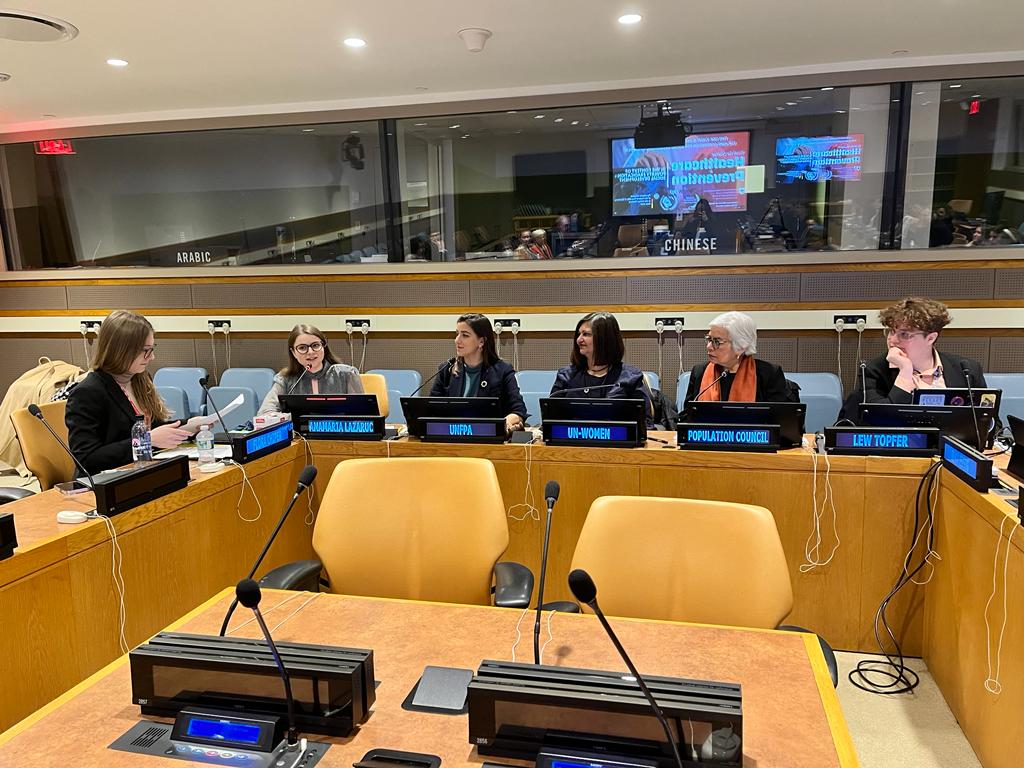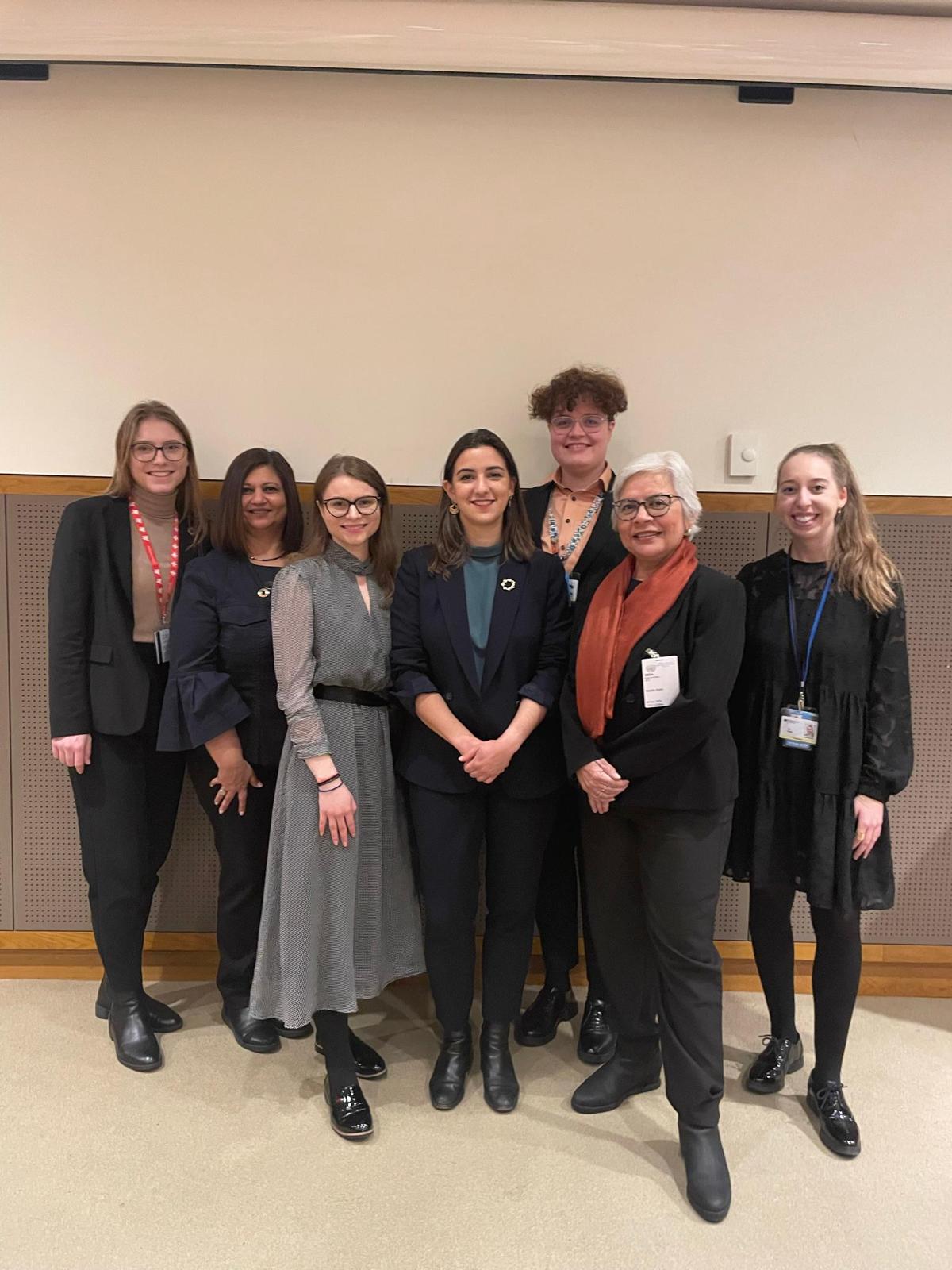
9th February 2024, UN Headquarters New York, CSocD62 Side Event organized by Flora Chiper (UNYD Switzerland) Anamaria Lăzăruc (UNYD Romania) Ilka Essig and Lew Töpfer (UNYDs Germany); and sponsored by the Permanent Mission of Switzerland to the United Nations Permanent Mission of the Federal Republic of Germany to the United Nations.
The event highlighted the entrenched relationship between poverty and poor health, emphasizing how socioeconomic factors perpetuate health inequities and create a vicious cycle. It aimed to explore strategies for breaking this cycle, particularly focusing on the intersection of Sustainable Development Goals (SDG) 1 (poverty eradication) and SDG 3 (good health and well-being), and how partnerships under SDG 17 (global partnerships) could contribute to progress.

Key discussions revolved around the impact of poverty on health, especially among marginalized groups like youth, and the importance of addressing systemic barriers to accessing quality healthcare services and education. The event emphasized the need for comprehensive approaches, including empowering youth through sexual and reproductive health and rights (SRHR) education and services, which can play a pivotal role in breaking the cycle of poverty.
Experts from UNFPA, UN Women, and Population Council, highlighted successful projects and interventions aimed at addressing these barriers. They underscored the importance of integrating an intersectional approach, empowering women and girls, and engaging communities to promote health and well-being.
Additionally, the event discussed the role of youth in shaping policies and programs related to health and poverty eradication, stressing the importance of youth empowerment and engagement in decision-making processes. The interactive nature of the event, enabled questions from and discussions with in-person participants as well as active global online participation.
Overall, the event advocated for solution-oriented interventions that address both public healthcare measures and socioeconomic factors, with a focus on empowering marginalized communities and fostering global partnerships for sustainable development.
Key messages & Recommendations
- Intersectionality and Gender Equality: The speakers emphasized the need to integrate an intersectional approach into health interventions, considering factors such as gender, socio-cultural background, age, and sexual orientation. They stressed the importance of addressing gender inequalities in accessing healthcare services and empowering women and girls to realize their rights.
- Community Engagement and Empowerment: Community engagement was highlighted as a critical component of sustainable interventions. Speakers discussed initiatives involving gatekeepers and peer-to-peer support to empower marginalized communities, particularly women and girls, and increase awareness about healthcare rights and services.
- Youth Empowerment and Engagement: There was a strong emphasis on the role of youth in driving change. Speakers discussed the importance of empowering youth to advocate for their health and well-being, including through comprehensive sexuality education and access to reproductive health services. They highlighted the need for platforms such as youth delegate programs to amplify youth voices in policy-making and program implementation.
- Multisectoral Approach and Sustainable Solutions: The speakers emphasized the importance of adopting a multisectoral approach to health, addressing factors beyond the healthcare system alone. They highlighted the need for interventions that address social determinants of health, such as access to clean water, sanitation, education, and social protection, to promote sustainable solutions for poverty eradication and improved health outcomes.
- Health Literacy and Education: Improving health literacy was mentioned as a key strategy for empowering communities. Speakers discussed the importance of creative initiatives aimed at improving health literacy and fostering dialogue about health issues within communities, particularly among youth.
Leading up to the event, a video-campaign was created to raise awareness for SRHR and mental health of youth – the main topics discussed at this side-event. The goal was to feature young experts, in-field workers at the intersection of socioeconomic inequalities and health, and founders of youth health organizations as well as members of the WHO Youth Council. Youth from around the globe (including from but not limited to: China, India, Malawi, Nigeria, Romania, Switzerland, Uganda, USA) created video statements which were posted on UNYD social media channels. The campaign created awareness, fuelled the conversation and increased online and in-person participation. The full videos were displayed at the beginning and end of the event and can be watched in the event recording.
For more information about the 62nd Commission for Social Development (CSocD62), please visit: https://social.desa.un.org/csocd/62nd
Source: Permanent Mission of Switzerland to the UN
 Welcome to the United Nations
Welcome to the United Nations